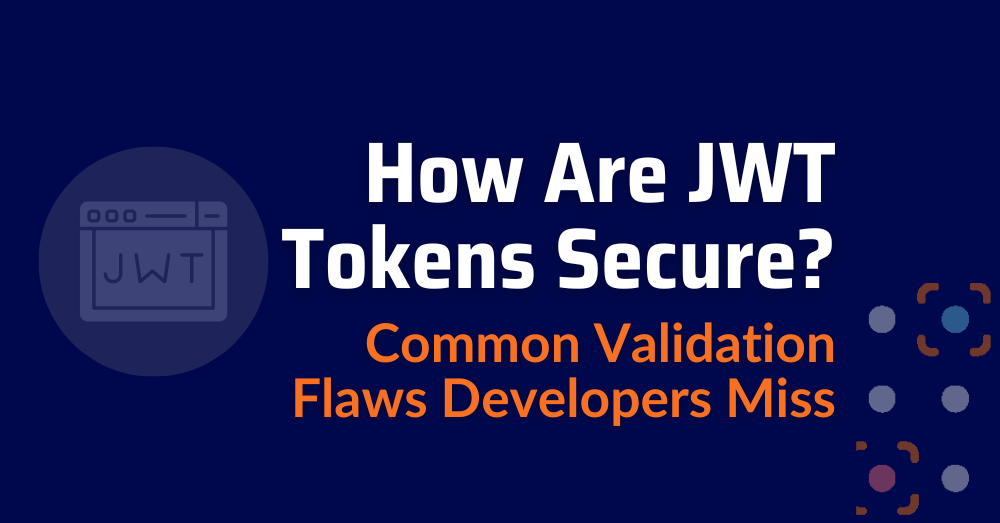To answer the question how are JWT tokens secure, the answer is: only if every validation step is done correctly. At their core, JWTs (JSON Web Tokens) use cryptographic signatures to ensure the token was issued by a trusted source and hasn’t been tampered with. When correctly implemented, this offers a stateless way to authenticate users and services. But here’s the catch: JWTs are not secure by default. Their security depends entirely on how you handle JWT validation.
The token itself isn’t magic. It’s just a Base64-encoded JSON structure with a header, payload, and signature. What protects it is proper validation. Skip or misconfigure any part, and you’re basically handing out blank access cards.
This happens more often than you’d think. Developers trust JWTs because they look cryptographically sound, but forget that JWT validation is what actually enforces the rules.
Dangerous Omissions in JWT Validation: alg: none, Missing exp, and aud
alg: none, Accepting unsigned tokens
This one is infamous. If your code accepts JWTs with alg: none, it will treat unsigned tokens as valid. This breaks JWT security completely.
Node.js Example:
const jwt = require('jsonwebtoken');
const token = jwt.sign({ role: 'admin' }, 'mysecret', { algorithm: 'HS256' });
// Exploit: attacker crafts token with alg: none
const fakeToken = Buffer.from(JSON.stringify({ alg: 'none', typ: 'JWT' })).toString('base64') + '.' +
Buffer.from(JSON.stringify({ role: 'admin' })).toString('base64') + '.';
jwt.verify(fakeToken, null, { algorithms: ['none'] }); // Never do this
⚠️ Educational example, do not run in production
Missing exp, Tokens that never expire
Without an exp claim, JWTs live forever. That means a compromised token grants indefinite access, breaking your JWT security posture. So, how are JWT tokens secure?
Python Example:
mport jwt
payload = {"user_id": 1} # No expiration
encoded = jwt.encode(payload, "secret", algorithm="HS256")
⚠️ Educational example, do not run in production
If you skip exp checks, you’re not really performing complete JWT validation. You’re trusting a token to behave nicely forever.
Ignoring aud, Misused across apps
The aud claim ensures the token is intended for your service. Ignoring this lets tokens be used in unintended places.
Failing to check this means any token with a valid signature can access endpoints it wasn’t meant to reach. A huge JWT security gap. So, how are JWT tokens secure?
Real JWT Security Gaps in CI/CD and Microservices
Secret reuse across environments
Hardcoding the same signing key across dev, test, and prod means a leaked dev secret = full prod access. JWTs rely on trust boundaries. Don’t flatten them. This is a classic failure in JWT validation.
Inconsistent JWT validation across microservices
When services validate JWTs differently, attackers can find the weakest link.
Example: one service checks exp and aud, another skips both. The attacker sends valid tokens to the weak service to escalate privileges or pivot internally. So how are JWT tokens secure when each service enforces different rules? They aren’t.
Insecure token propagation
Passing JWTs in URLs or logs exposes them to unintended actors. In CI/CD, tokens often travel through multiple hops. If any point logs headers or URLs, the JWT may be exposed, breaking JWT security.
CI/CD Leak Example:
- Step 1: Token sent via CLI to trigger a deploy.
- Step 2: CLI tool logs full URL with token in GET parameter.
- Step 3: Logs are shipped to third-party service.
Result? JWT is compromised.
Fixing JWT Validation in Dev and CI Pipelines
Enforce full claim checks
Always validate:
- Signature (never accept alg: none)
- exp (expiration)
- aud (audience)
- iss (issuer)
- Optional: nbf, iat
This is the foundation of strong JWT security. If you’re not enforcing full JWT validation, you’re wide open.
Use mature libraries
Use trusted libraries that fail safely:
- Node.js: jsonwebtoken, jose
- Python: PyJWT, Authlib
Avoid rolling your own validation. Use built-in JWT validation features.
Secret management
Use secret managers (Vault, AWS Secrets Manager, Doppler) to rotate and scope JWT secrets properly. Poor secret hygiene is a massive JWT security risk.
Threat modeling JWT flows
In pipelines, think like an attacker:
- Can a token leak in a log?
- Is JWT validation consistent across services?
- Can I reuse a token across environments?
Asking “how are JWT tokens secure?” should be a checkpoint, not an assumption.
How are jwt tokens secure? Securing JWT Security Across Environments and APIs
Apply policy-as-code
Define and enforce token validation rules as code (e.g., OPA, Kyverno). That way, services can’t skip JWT validation without alerting.
Validate at API gateways
Let your gateway (e.g., Kong, Envoy, AWS API Gateway) enforce JWT validation before traffic hits internal services. This improves JWT security across the board.
Monitor token usage
Log when and where tokens are used. If a token suddenly jumps regions or services, flag it. Use SIEMs or behavior analytics for detection.
Limit token scope
Use short-lived tokens and limit scopes via claims. Don’t issue long-lived, overly privileged JWTs. That’s not how JWT security works.
So, JWT Validation: Your Last Line of Defense
How are JWT tokens secure? Only if you make them secure. JWTs offer cryptographic integrity, but they don’t enforce security on their own. Most JWT validation issues come from poor implementations.
Common missteps, like accepting alg: none, skipping exp or aud, reusing secrets, or failing to validate consistently across services, undermine the very trust JWTs are supposed to bring. If you wonder how are JWT tokens secure, remember: only through rigorous, consistent JWT validation.
Tools like Xygeni help enforce correct validation, check for missing claims, and secure JWT use in DevSecOps pipelines. They surface real JWT security risks, especially in CI/CD and microservices, where token misuse can have production-level consequences. JWTs ≠ are secure by default. Secure your validation or prepare for breaches. Make JWT validation part of your baseline, not your afterthought.








